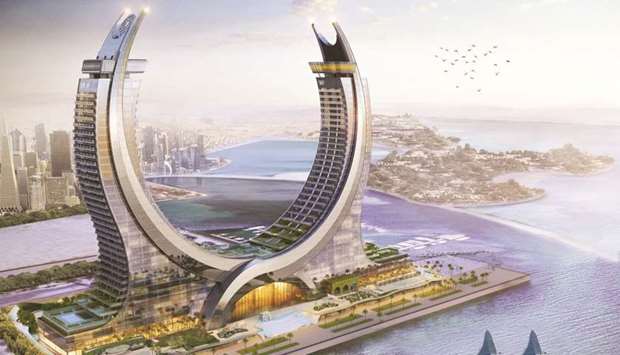The Katara Towers development in Lusail Marina District has become the first hospitality project in Qatar to receive a Global Sustainability Assessment System (GSAS) Design & Build (D&B) 5-star rating certificate at the design stage, Katara Hospitality has announced.
The Global Sustainability Assessment System is the Mena region’s first performance-based green building certification system utilised by buildings, districts and infrastructure projects to assess their environmental impact. With the project design assessed by sustainability experts at the Gulf Organisation for Research & Development (Gord), the awarded provisional certificate reflects the expected level of green credentials to be achieved by Katara Towers upon completion, according to a press statement by Katara Hospitality.
Speaking about the project, founding chairman of Gord Dr Yousef Alhorr said: “GSAS-D&B has been implemented in a range of public and private projects in Lusail City but the iconic twin towers stand out in more ways than one. As the first GSAS-D&B 5-star hotel project, Katara Towers will be a pioneering name in Qatar’s sustainable hospitality sector. The provisional certificate marks the continuity of Katara Hospitality’s journey towards sustainable built environment.”
“Katara Hospitality is one of the first investors that understood the significance of the project, and our aim was to create the hospitality icon of the 21st century that is within one of the world’s most exciting urban developments. Our vision is to set new standards that go beyond the borders of the hospitality industry and provide a landmark location that is instantly recognised internationally,” said Sheikh Nawaf bin Jassim bin Jabor al-Thani, chairman of Katara Hospitality.

An artist's rendition of Katara Towers, Lusail Marina District.
“We have put in place a comprehensive, integrated approach to sustainability as we are strong believers that travel and tourism are one of the world’s largest economic and employment sectors and consequently has a huge global influence on the environment. Sustainability is an important element in shaping how we better manage our costs and revenue. Being responsible reduces our expenditure, especially on energy. We have increased our focus on understanding the environmental impact of our activities to reduce negative environmental impacts resulting from our activities by adopting environmentally preferable business practices and innovative technologies,” he explained.
Sheikh Nawaf continued, “While we regard 2022 as a milestone in the country’s development, this new property in Lusail will also occupy a focal point for residents and travellers during the FIFA World Cup. We believe this is our opportunity to showcase a country that has grown into an international destination and Katara Hospitality will create the landmark to underpin lifetime memories.
“As Qatar National Vision 2030 creates the perfect framework for us, we will continue to develop peerless hospitality at home and abroad that are not only jewels in our portfolio but are emblematic for Qatar as well.”
Under the scope of the GSAS-D&B certification for the towers, the project will feature a range of features aimed at minimising negative environmental impacts linked with building and construction.
To conserve energy consumption, all interior spaces with dense occupancy loads are proposed to be complemented with demand control ventilation. By using lighting control system and energy-efficient HVAC, fixtures and appliances, the project is expected to further reduce its energy footprint as well as the associated costs. As recommended by GSAS, the project will follow sub-metering approach whereby all major types of energy loads will be recorded separately to evaluate and improve energy performance. When it comes to energy conservation and efficiency, the project is implementing many additional measures, anticipating an overall 40% less energy consumption compared to a conventional building designs based on ASHRAE 90.1-2016 guidelines.
Understanding water as a finite earthly resource, the GSAS framework has a dedicated water category concerned with water conservation for indoor and outdoor use. To achieve the water conservation standards set forth by GSAS, Katara Towers will make use of water-efficient plumbing fixtures and appliances. The water used in hotel facilities is planned to be treated and reused alongside the stormwater collected over time. Ultimately, the reused water will meet the requirements of toilets flushing for indoor use as well as the irrigation needs required by the outdoor landscaping.
Similar to energy submetering, advanced water metering solutions will help keep a tab on overconsumption and water leakage across all facilities within the twin towers.
Focusing on the human wellbeing as addressed in GSAS, the twin towers will achieve healthy indoor environment by maintaining optimum levels of air quality, acoustics, lighting and thermal comfort.
The twin towers project has gone an extra mile by ensuring sufficient waste management procedures and facility management operations and engaging an independent commissioning agent prior to the installation of equipment and systems. A sustainable design will eventually give way to realise sustainable operations of the project in the long run.
Symbolically intertwined with Qatar’s heritage, the iconic towers in Lusail are an architectural translation of Qatar’s national seal, representing the traditional scimitar swords. Raising gracefully from the podium level, the arched towers will host a five-star hotel with 361 rooms and suites to cater to discerning business travellers, an all-suite hotel with 132 keys to meet the needs of those seeking sophisticated luxury accommodation and 49 apartments to become home to permanent residents.

